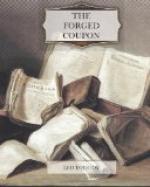“The disputes over arbitration had become so painful to me, the schoolwork so vague, my doubts arising from the wish to teach others, while dissembling my own ignorance of what should be taught, were so heartrending that I fell ill. I might then have reached the despair to which I all but succumbed fifteen years later, if there had not been a side of life as yet unknown to me which promised me salvation: this was family life” ("My Confession").
In a word, his marriage with Mademoiselle Sophie Andreevna Bers (daughter of Dr. Bers of Moscow) was consummated in the autumn of 1862—after a somewhat protracted courtship, owing to her extreme youth—and Tolstoy entered upon a period of happiness and mental peace such as he had never known. His letters of this period to Countess A. A. Tolstoy, his friend Fet, and others, ring with enraptured allusions to his new-found joy. Lassitude and indecision, mysticism and altruism, all were swept aside by the impetus of triumphant love and of all-sufficing conjugal happiness. When in June of the following year a child was born, and the young wife, her features suffused with “a supernatural beauty” lay trying to smile at the husband who knelt sobbing beside her, Tolstoy must have realised that for once his prophetic intuition had been unequal to its task. If his imagination could have conceived in prenuptial days what depths of emotion might be wakened by fatherhood, he would not have treated the birth of Masha’s first child in “Conjugal Happiness” as a trivial material event, in no way affecting the mutual relations of the disillusioned pair. He would have understood that at this supreme crisis, rather than in the vernal hour of love’s avowal, the heart is illumined with a joy which is fated “never to return.”
The parting of the ways, so soon reached by Serge and Masha, was in fact delayed in Tolstoy’s own life by his wife’s intelligent assistance in his literary work as an untiring amanuensis, and in the mutual anxieties and pleasures attending the care of a large family of young children. Wider horizons opened to his mental vision, his whole being was quickened and invigorated. “War and Peace,” “Anna Karenina,” all the splendid fruit of the teeming years following upon his marriage, bear witness to the stimulus which his genius had received. His dawning recognition of the power and extent of female influence appears incidentally in the sketches of high society in those two masterpieces as well as in the eloquent closing passages of “What then must we do?” (1886). Having affirmed that “it is women who form public opinion, and in our day women are particularly powerful,” he finally draws a picture of the ideal wife who shall urge her husband and train her children to self-sacrifice. “Such women rule men and are their guiding stars. O women—mothers! The salvation of the world lies in your hands!” In that appeal to the mothers of the world there lurks a protest which in later writings developed into overwhelming condemnation. True, he chose motherhood for the type of self-sacrificing love in the treatise “On Life,” which appeared soon after “What then must we do?” but maternal love, as exemplified in his own home and elsewhere, appeared to him as a noble instinct perversely directed.




